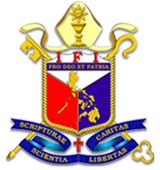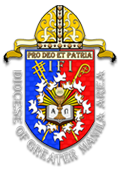This year (October 10, 2020) we commemorate the death anniversaries of two of the great leaders of the Iglesia Filipina Independiente, Don Belong, Isabelo delos Reyes Sr. (82nd year) and his son Beluco, Obispo Maximo Isabelo delos Reyes Jr. (49 th year). Both passed away on this destined 10 th day of October, hence dubbed as the Double Ten. Devoid of the traditional pomp and circumstance, the quiet celebration will take place in accord with the health protocols of this Covid19 pandemic. DGMA Bishop Vicente Salvador Ballesteros and the diocesan clergy, without laity presence, will celebrate the Holy Eucharist in thanksgiving for their lives, ministries, and great contributions to this Nationalist Church.
The annual ceremonial dinner, a showcase of talents, will not be held this time; so too with the awarding of the Delos Reyes Cross first given starting October 10, 1972. Traditionally, ten exemplary parish/mission leaders are chosen by their constituents to honor their outstanding contributions. Sadly, there will be no awardees this year.
With their demise, providentially, they did not witness the maleficence of two great horrific events in Philippine history. Don Belong died of paralysis on October 10, 1938, before the Second World War where the Philippines became one of the centers of battles between theAllied Forces (United States, Great Britain, and France) and the Axis Power (Germany).
Similarly, Bishop Beluco departed this earth while celebrating the Holy Mass in Maria Clara Christ’s Church, Sta. Cruz, Manila on October 10, 1971, before President Ferdinand Marcos’ declaration of Martial Law on September 21, 1972.
Don Belong is joyfully remembered as a revolutionary propagandist, socialist union leader, church liturgist, and nationalist public servant. As a propagandist, he published articles and newsletters both in the Philippines and in Spain, such as the Sensecional Memoria on 1897, La Sensecional Memoria Sobre la Revolucion Filipina, Independencia y Revolucion (book), and periodicals like El Defensor de Filipinas and Filipinas Ante Europa (1899-1901). These propaganda tools were used to support the revolutionary activities for national independence from Spanish colonialization led by the Katipunan. After release from prison at Montjuich Castle, Barcelona, Spain, he returned to Manila with Marxist and socialist ideas in March 1901.
With the local labor leaders, he led the Union Obrera Democratica that instigated labor strikes in Manila and proclaimed the founding of the Iglesia Filipina Independiente. He also helped frame the IFI Doctrinas Reglas y Constitutionales of 1903. Translating the New Testament Bible into Ilocano, he too helped initiate the formulation of the IFI Oficio Divino, and with Obispo Maximo Gregorio Aglipay published the Biblia Filipina, Calendario Aglipayano, Novenary of the Birhen Balitawak and other liturgies of the Church. Elected councilor of Manila and later Senator of the Philippines, he supported the struggle for “immediate, absolute and complete” national independence and the struggle of the peasant groups, like the Colorums and Sakdalistas, in their struggle for land rights and religious freedom and human rights.
“Fake news” was disseminated by the enemies of the IFI that Don Belong returned to the Roman Catholic Church before his death. The minister who officiated in the necrological service for his burial was OM Gregorio Aglipay. Simeon Mandac, Bishop Aglipay’s wartime comrade, private secretary and governor of Ilocos, documented the event:
“1938, October 11. Mons. Aglipay officiated in the necrological service held at the Funeraria Nacional on Rizal Avenue for the late Isabelo delos Reyes Sr. He was assisted by Bishop Isabelo delos Reyes Jr., one of the sons of the deceased, and by other dignitaries of the Philippine Church….The service was attended by a large group of relatives and friends of Delos Reyes. Among the children of the deceased, Pablo, Estanislao, Enrique, Jose, Luis, Elias, Concepcion and Leon were present. “Hermenegildo Cruz, former Director of Labor, and now technical adviser on labor at Malacañng, called a rally for a mammoth labor parade or demonstration to accompany the cortege from the funeral parlor to the cemetery in recognition of Delos Reyes’ services in behalf of labor, the deceased having been recognized as the first real labor leader of the country…The internment was made in the family plot in the Cementerio del Norte. Delos Reyes died of paralysis. He had been suffering from it for ten years.”
Likewise, the death of Bishop Beluco was a great loss to the IFI. The National Church remembered him as a close associate of OM Aglipay as English interpreter when the former accompanied the latter in meetings with the leaders of the Unitarian Church (1931) and lobbied for national independence in America (1934). As the diocesan bishop of Manila, Bishop Beluco helped OM Aglipay in the propagation of the Novenary of Birhen Balintawak. The icon/image was installed in Bishop Beluco’s diocesan seat, the Maria Clara Christ’s Church, in September 1924. He re-directed the mainline Church with Trinitarian teachings, forged concordat relations with Catholic tradition (Anglican and Old Catholic), but not under the Roman Catholic leadership, with the help of the Protestant Episcopal Church of USA (PECUSA) starting in 1947. In November 1963, he was elected the first head of the National Council of Churches in the Philippines (NCCP). As Obispo Maximo starting September 1946, he led the Church in the efforts to establish the National Cathedral and to organize the IFI sectoral organizations. Together with bishops faithful to the IFI tradition, he pursued the constitutional, doctrinal and
liturgical renewal in the midst of the threats of separation and factionalism. OM Beluco had lived-out the mission and ministry Christ had commanded him. In that struggle he used the Christian Register, official IFI paper since 1952, as a tool to unite the faithful of the IFI.
“In the three decades that would follow, under the competent leadership of Bishop Isabelo delos Reyes as the fourth Obispo Maximo (1946-1971), the Church would concentrate on developing and nurturing its institutional life. Bishop Delos Reyes strengthened the theological position of the Church and ushered in the forging of concordat relations with various Churches in many countries and sought membership in national and international ecumenical bodies.” (History of IFI, ifi.ph)
Don Belong had a famous saying: “Lack of social justice causes social unrest.” Putting this into action, OM Beluco played the role in consolidating the Church during the “social unrest” which the Second Propaganda Movement re-sounded throughout the country in 1964. He had drawn and encouraged the IFI youth and students to get organized. After his death in 1971, he missed witnessing his beloved young people participating in “social unrest” because of “social injustice.”… “The rising nationalist current and restlessness of the militant students and mentors swept the universities and colleges. Worker and peasant movements in the countryside had been mounting and intensifying. The revolutionary fervor had inevitably challenged the IFI to look back to its origin and define its present task amidst the escalating social upheavals.” (IFI Historical Sketch, Centennial Commemorative Bible 2002).


